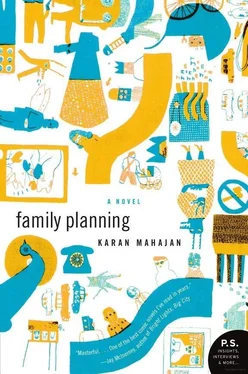With a jerk of the hand brake, Mr. Ahuja — lacking both a sturdy alibi and a secret lover — backed the car out of the driveway and drove to the SPM’s residence.
OF COURSE, ARJUN DIDN’T WANT TO GO to America: America, like Rashmi, was beside the point. He just wanted to feel special again — to feel loved and admired by his Papa for reasons that were sewn into the fabric of his personality — as opposed to being jerked around on the end of a bungee cord thrown from a point in the past that was unreachable. He wanted to plummet back into familiar patterns immediately. Play out his daily routine to its limit. Go switch-eroo a baby’s diaper, gasp at the audacious stylings of Mama’s knittings, bully the hell out of his siblings. Not that he thought of it as bullying, but what else was the correct term for accusing Sahil of being a girl, and then challenging a scared five-year-old to an arm-wrestling showdown? The act of bullying was a sacred one, like the occasional flooding of dry land, a message that one’s life was always lived in the shadow of chaos and uncontrollable forces — that if you were a three-year-old and felt jealous of the newborn and attempted to chuck an ashtray at it, a whole year’s worth of correction would await you, you’d find yourself at a table with all the seats taken, you’d go out in the playground and suddenly be paying obeisance to a large puddle of mud, you’d go on a car trip and remain locked in with the windows up because only dogs died in hot cars — not humans. Bullying, then, was a reminder you were human. It was a reminder you were related.
But today his purpose was very much the opposite. He wished to taunt his siblings till they broke down and said: Whatever, you’re just a stepbrother. Till they said: Fuck you, we owe you nothing . Till they said: You’re an untouchable in our eyes.
Or something dramatic like that.
Unfortunately, there were no experimental subjects to be found. Rita and Tanya’s room was empty — they were probably helping Mama unclip the laundry from the sagging clotheslines in the garden. Rishi was sitting on a stool in the lobby folding a paper plane from a stiff, crackling copy of the Times of India ; Arjun felt simultaneously too grandiose in his needs to bother with such an easy victim and also secretly afraid of the damaging effects of Rishi’s signature “sorry flurries” on his spongy psyche.
Finding no one to bully, Arjun decided to, ahem, bully himself: He retired to the bathroom to masturbate. First, he was gentle. He very nonviolently examined his circumcised penis. He wanted to find images of similar penises on the Internet, but that is something a man cannot do: Google his own penis. So he tried to masturbate to a vision of Aarti. The attempt ended in failure and chafing. This meant that he must really like Aarti , he decided. When he liked (as in really liked ) a girl, he couldn’t bring himself to think about touching her, holding her, penetrating her. He could only think about marrying her. Besides, he had inherited from his mother a love for the classified section of the newspaper; he scanned it now and read the marriage section of the Times of India with the varying empathies of a suitor, a bridegroom, a dowry-less girl, and a horny student.
Marriage. Yes. He tried to imagine having sex with Aarti in a wedding tent, their legs double-helixed, a garden full of sexy special-effect dust, crowds of people picking their noses. But he couldn’t hear the crowds. The house was bizarrely and insultingly quiet. The tap next to the toilet was dripping into a blue plastic mug. Rishi knocked on the door and said, “Scuba diving or what?”
Arjun toppled the mug and exited sheepishly. “I left fish for you in the toilet,” he said to Rishi.
He figured he’d just have to try masturbating again later. Or would that be futile.
He needed a strong glass of scotch in order to decide. He went to the dining room and stood romantically before the liquor cabinet. His father never drank. He himself — a rock star! — had never drunk. The cabinet was locked; it taunted him with a great rattle of the shelf when he tugged on the knob; he gave up. He stared at the reflection of his face as it was distorted between the columns and columns of brown liquor, their labels removed in the interests of democratic drinking — a giant refraction chamber. To resemble someone or something you’ve never seen was to be diminished, boxed, predetermined. What did his real Mama look like? Was she simply all that was left when you subtracted from Arjun’s face all of Papa’s features? Take away the unruly eyebrows. Lop off the hooked nose. Sandpaper away the first grain of stubble. What was she now? What? A human pear. A rotten, fetid human pear with eyes. An ugly piece of modern art. An abstraction. A nothing. She was the true stepmother, a veiled tyrant ushered into his life nearly two decades after he’d been born.
In the nursery Mrs. Ahuja was readying to throw herself — body, knitting, buttocks, and all — on a chair. Free fall at 9.8 meters per second squared was her idea of sitting, and the fate of the plastic dark glasses on the chair was a straightforward flattening.
He said, “Watch out, Mama.”
The house had been littered with dark glasses ever since the last conjunctivitis scare; for five days the children had all worn shades and walked about the house with a funereal solemnity. Papa’s old briefcases appeared out of nowhere. Sahil, six, was seen moping over a sheaf of paper. Soon, however, it was determined that the conjunctivitis scare was just that: a scare.
Mrs. Ahuja sat on the shades after all.
Arjun held the arms of the white plastic chair, wincing, bemoaning. But it was routine wincing, bemoaning and so he enjoyed it. “Mama, you should wait. I was telling you—”
“If you had said: Wait, wait, wait, then I would understand. And how come you are not looking? Babies are doing the latrine—”
Still she made no effort to retrieve the crushed plastic.
“Mama—”
“Accha. Where is he? Kindly tell him to come here, and—”
Arjun had a 97.6 percent success rate in ascertaining who exactly Sangita’s ephemeral “he” referred to; today he rightly assumed it was—
“Shankar!” he shouted. “Shankar!”
Shankar arrived, pulling at his Hitler mustache like it was a rotten Band-Aid. He had an empty tray in his hand.
“Bring the broom,” Sangita commanded. “Then put two stools on top of each other, stand on them, and then kill the mosquitoes on the roof. Obviously, switch off fan first. Otherwise you will get a free haircut? You are seeing? Then bring bucket. Fill with water. Then tell bachas to come inside. Then throw on verandah. Understand? Understand? How dirty it is now. Dirty, dirty.”
At leisure, Shankar took off one of his rubber Hawaii chappals, kneeled, and held it up as if to squash an insect. Of course there was no insect. Only Mrs. Ahuja throwing the broken dark glasses on the ground.
“What are you doing? Take this,” she said, kicking the glasses. “Go take this. Tell her she can give it to him.”
“Mama! At least use the maid’s name,” said Arjun. “Shanti. She’s been here one year. And don’t give the broken glasses to her.”
“One tho I am doing the charitable act and you are saying this,” she said in English. “In front of servant that also!”
“He understands English—” Arjun hissed, pointing to Shankar.
Shankar played dumb. Mrs. Ahuja played dumb. All the babies begged for milk.
“Sleep!” said Mrs. Ahuja. It was her one stock phrase. “Babies! Sleep!”
Arjun went one-by-one from baby Vikram to baby Gita to baby Sonali and crossed their tiny arms and legs like they were baby yogis doing baby yoga. He loved making toddlers perform their little exercises. They appeared to love it too. They gurgled and spat. Then Arjun said, “Mama. What happened to Rohan Trivedi?”
Читать дальше












